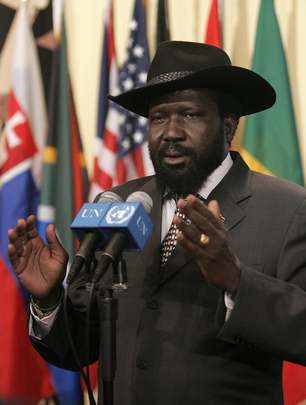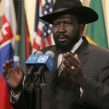
BRIEFS
Publication: Terrorism Monitor Volume: 12 Issue: 9
By:

CRISIS IN SOUTH SUDAN PART ONE: SHAKE-UP IN MILITARY LEADERSHIP REFLECTS TRIBAL CRISIS
Andrew McGregor
As the security situation in the Sudan continues to deteriorate, Government of South Sudan (GoSS) president Salva Kiir Mayardit has overhauled the nation’s military leadership with a pair of controversial appointments. The dismissal of General James Hoth Mai, a Nuer, as chief-of-staff of the Sudanese Peoples Liberation Army (SPLA) has been interpreted as part of the president’s efforts to surround himself with Dinka veterans of the civil war as the political dispute that began in December evolves into a general Dinka vs. Nuer struggle for dominance in South Sudan. Defections from the SPLA, both individual and en masse, continue to cause instability in the Army (Radio Tamazuj, April 25).
GoSS Information Minister Michael Makuei Lueth said Mai’s removal was “a normal release and retirement” that had “nothing to do with the performance matters or anything linked to politics” (Sudan Tribune, April 25). It was the second major shake-up of the SPLA’s military leadership this year; in January, Kiir dismissed all six of General Mai’s deputies and replaced them with newly promoted officers (Sudan Tribune, January 22).
General Mai urged the people of South Sudan not to use his dismissal for political purposes: “I thank our people and urge them to not use my relief as a reason to prolong the war. I always say war cannot be a solution to anything. Dialogue is always the best option to resolve differences” (Sudan Tribune, April 24).
Mai joined the SPLA rebellion in its early days in 1983 and became a bodyguard to the SPLA commander, Dr. John Garang de Mabior, who later sent Mai for military training in Cuba, Ethiopia and the United States. When the SPLA split along ethnic lines in 1991, Mai refused to join the largely Nuer faction under Riek Machar and instead remained loyal to Garang and the Dinka-led original SPLA. Given that Machar and the Nuer dissidents were eventually compelled to rejoin the movement, Mai could argue he made the right choice, but he has since been viewed with suspicion by many Nuer who see him as irrevocably pro-Dinka. Mai replaced Oyai Deng Ajak (currently under detention on coup charges) as chief-of-staff in 2009 and became a full general the following year. Mai was the most prominent Nuer in the South Sudan military and administration.
Mai was replaced by General Paul Malong Awan Anei, the Dinka former governor of Northern Bahr al-Ghazal state. The new chief-of-staff helped direct the operations in Juba in December that launched the conflict and is regarded as a Kiir loyalist with a strong pro-Dinka agenda. Malong was a senior SPLA commander during the civil war and was appointed governor of Northern Bahr al-Ghazal in March 2008. Malong’s personal conduct as a SPLA commander led to friction with late SPLA leader Dr. Garang, leading to his arrest in 1991 (Sudan Tribune, November 17, 2013). Malong is widely believed to be illiterate, but claims he can read and write Dinka (Sudan Tribune, March 26).
Malong’s authoritarian style made him unpopular in many parts of Northern Bahr al-Ghazal, but his personal loyalty to Kiir allowed him to evade discipline for defying Kiir’s orders in 2013, with a forgiving Kiir saying: “Malong is not the first official to break the law. He is not the first official to fail to implement directives from my office” (Sudan Tribune, March 26, 2013).
In December 2013, residents of Aweil (the capital of Northern Bahr al-Ghazal) called for Malong’s removal, charging him with embezzlement of public funds, theft of medical supplies and arbitrary rule: “The Governor puts himself in a position of prosecutor and/or a judge in the State. He orders the arrest and release of individuals according to his wishes” (Sudan Tribune, December 4, 2013). Malong is also accused of recruiting a tribal militia of 15,000 in the Bahr al-Ghazal region, a move that is believed to have been opposed by General Mai (Nyamile News, April 23).
The new chief-of-staff has promised to take an aggressive stance in bringing the rebellion to an end:
I will go to Upper Nile region and fight there myself. I will need to get that so called Riek Machar and fight him. He either has to catch me or I will catch him. I had a secure job before I accepted this new role. I don’t want people to be killed mercilessly like this by the rebels. I will finish this rebellion and bring this crisis to an end. (Upper Nile Times, April 24).
At the same time, President Kiir relieved Major General Mac Paul Kuol (a Dinka) from his duties as head of military intelligence. Mac Paul appears to have brought his termination about when he failed to support the government’s official description of the December events in Juba that launched the conflict as a “coup attempt” while testifying as a prosecution witness at a related treason trial, suggesting the violence began as the result of a disagreement between factions of the presidential guard, a more likely interpretation of events (Radio Tamazuj, April 24). Mac Paul had run-ins with the regime before becoming head of military intelligence – in July 2012, he was arrested along with 15 other officers on charges of planning a coup against Salva Kiir, though Kiir later dismissed the charges, describing them as the result of a fabrication created in Khartoum (Sudan Tribune, July 31, 2012; Radio Tamazuj, August 2, 2012).
Mac Paul’s successor as head of military intelligence, General Marial Nuor Jok, a Dinka and former Director of Public Security and Criminal Investigations, is a surprising choice based on his record. While supposedly in charge of public security, Nuor was accused of torture, extortion, extra-judicial killings, the creation of illegal detention centers and the arming of a personal tribal militia (Upper Nile Times, December 14, 2011). Nuor was arrested in August 2013 in connection with the disappearance of Engineer John Luis Silvio following a land dispute. Nuor was given leave to seek medical treatment in Nairobi during his trial. He did not return as scheduled and the proceedings appear to have been abandoned.
In 2012, General Mai noted that Mac Paul and Marial Nuor were “controversial figures. Their names have always appeared in illegal detention and torture of their opponents” (Radio Tamazuj, August 2, 2012). The shake-up in the SPLA leadership was not welcomed by the rebel camp; a spokesman for Riek Machar’s faction of the SPLA said the changes marked the beginning of “an imminent bloodbath, escalation and regionalization of the conflict” (Sudan Tribune, April 25).
CRISIS IN SOUTH SUDAN PART TWO: CIVILIAN MASSACRES MARK STRUGGLE TO CONTROL OIL INDUSTRY
Andrew McGregor
Government of South Sudan (GoSS) forces are battling rebels under the command of former South Sudan vice-president Riek Machar for control of Paloch in Upper Nile State, home of the nation’s largest oil installation. The rebels have said they intend to take control of all of South Sudan’s oilfields to prevent President Salva Kiir Mayardit from “using the oil revenues to finance his war and hire foreign mercenaries” (Sudan Tribune, April 23; Reuters, April 24). However, according to Sudanese Peoples Liberation Army (SPLA) spokesman Colonel Philip Aguer, it is “the dream of Riek Machar and his forces to either destroy the oil industry or control it or divert it. To whom, we don’t know” (VOA, April 24).
The civilian population of the oil-rich Greater Upper Nile region (which includes Jonglei, Unity and Upper Nile states) has been targeted by both rebel and government forces battling for control of the oil fields. Bentiu, the capital of Unity State, was taken over by rebel forces (including the notorious Nuer “White Army”) on April 15. The occupiers then launched attacks on civilians who had gathered in hopes of safety at the local hospital, the Catholic church, the vacated World Food Program compound and the Bentiu mosque. According to UNMISS, more than 200 civilians were killed and over 400 wounded at the mosque alone. The mission also condemned the use of Radio Bentiu FM to “broadcast hate speech” and calls for mass rape during the opposition’s investment of the city (Sudan Tribune, April 21). During the attacks, gunmen demanded that their captives identify their ethnicity and origin and then killed all Dinkas and Darfuris. Many of the latter were traders operating from nearby Darfur.
A spokesman for the rebels’ so-called “SPLM-In-Opposition” claimed government forces had massacred the Dinka and Darfuri population of Bentiu before evacuating it. The bodies were then collected and piled in “sensitive” places to “make it look like organized executions by the incoming opposition forces.” The spokesman further claimed the dead Darfuri civilians were actually Justice and Equality Movement (JEM) fighters from Darfur who had changed into civilian clothes during the fighting for Bentiu. [1] Elsewhere, however, the commander of the SPLA’s 4th Division (a largely Nuer unit now fighting on the rebel side), Major General James Koang Chol, said the alleged JEM fighters “were in military uniform and participated in active combat against our forces… We would not have killed innocent Darfur civilians. We don’t see them as our enemies” (Sudan Tribune, April 24).
JEM denies any involvement in the South Sudan conflict, but Koang claims the movement is concerned for its supply lines running from their current bases in north Kordofan to South Sudan (Radio Tamazuj, January 2). Opposition forces claimed to have killed a JEM major-general and a brigadier while inflicting a recent defeat on JEM forces in Unity State (Sudan Tribune, April 25). [2] JEM and the GoSS have long-standing ties, but the degree of their military cooperation has always been a matter of some contention.
The Bentiu massacre was followed two days later by an attack by gunmen armed with RPGs on Nuer refugees in the UN compound in Bor, the capital of Jonglei State. Peacekeepers from India, Nepal and South Korea were unable to prevent the slaughter of at least 46 Nuer, with hundreds more wounded (South Sudan News Agency, April 22; BBC, May 1). Bor was the scene of a massacre of some 2,000 Dinka civilians by Nuer forces under Riek Machar’s command in November 1991.
Kenyan president Uhuru Kenyatta has warned that Kenya will not stand by and allow the situation in neighboring South Sudan to descend into genocide. [3] Uganda is providing military support to the GoSS and the evacuation of these forces is one of the primary demands of the opposition. Uganda appears eager to accommodate this demand as soon forces from the eight-nation Inter-Governmental Authority on Development (IGAD) are ready to deploy in South Sudan to protect oilfields and strategic towns. Three battalions totaling 2,500 troops from Ethiopia, Kenya and Rwanda are expected to have a UN-authorized mandate to use greater force to protect civilians. The deployment has been delayed due to the opposition of Riek Machar’s forces.
In the face of atrocities by both sides, the UN Security Council is re-examining the mandate of UNMISS on the assumption that the GoSS is no longer a reliable partner (Reuters, April 24). China, the largest investor in the South Sudan’s oil industry, is naturally concerned about supply interruptions and has even taken the unusual measure of offering its services as a mediator (BBC Chinese, January 8). With government troops poised to retake Bentiu, there are fears of new killings targeting the thousands of Nuer civilians who have taken refuge in the town’s UN compound.
Notes
1. James Gatdet Dak, Spokesperson of the chairman of SPLM-In Opposition: “Response to allegations of massacres in Bentiu,” April 25, 2014, https://www.sudantribune.com/spip.php?article50778.
2. Brigadier General Lul Ruai Koang, Directorate of Information and Moral Orientation, Office of Military Spokesperson for SPLA in Opposition, Press Release no. 53, April 24, 2014.
3. Kenya Presidency (Nairobi), Statement on South Sudan by President Uhuru Kenyatta, Chairman of the East African Community and Rapporteur of the Inter-Governmental Authority on Development (IGAD), April 25, 2014, https://allafrica.com/stories/201404251580.html.





